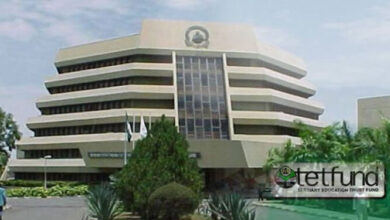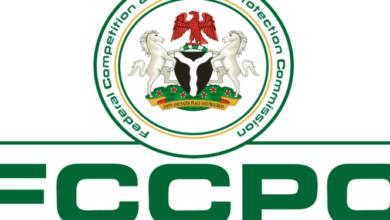Ecobank Group H1 2024 Result: Continental Structure Supports 179.26% Gross Earnings Growth
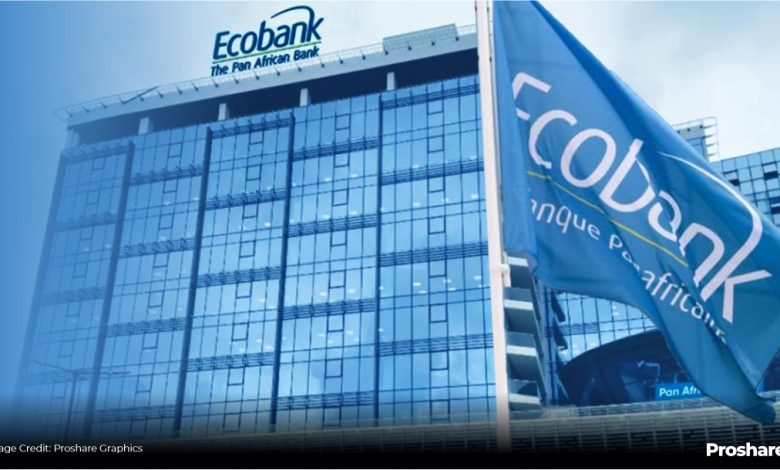
Despite the diverse risks (currency depreciation, interest rate volatility, inflationary pressure, rising debt levels, and geopolitical risk) created by its continental subsidiaries broad structure ,Ecobank is absorbing them to achieve more vigorous groupwide corporate growth. ETI saw top-line and bottom-line earnings grow by triple digits, driven by continental monetary tightening and currency depreciation. The Holdco had larger foreign revaluation gains and interest income from Anglophone West Africa (AWA), Central, Eastern, and Southern Africa (CESA), and Francophone West Africa (UEMOA), which offset the laggard Nigerian performance. The continental outcomes improved most financial ratios in H1 2024, except for the cost of risk (CoR), which rose to 2.07%, implying rising risk cost. However, the lower nonperforming loan ratio (NPLR) would suggest a tighter rein on credit quality (see table 1 below).
Table 1:
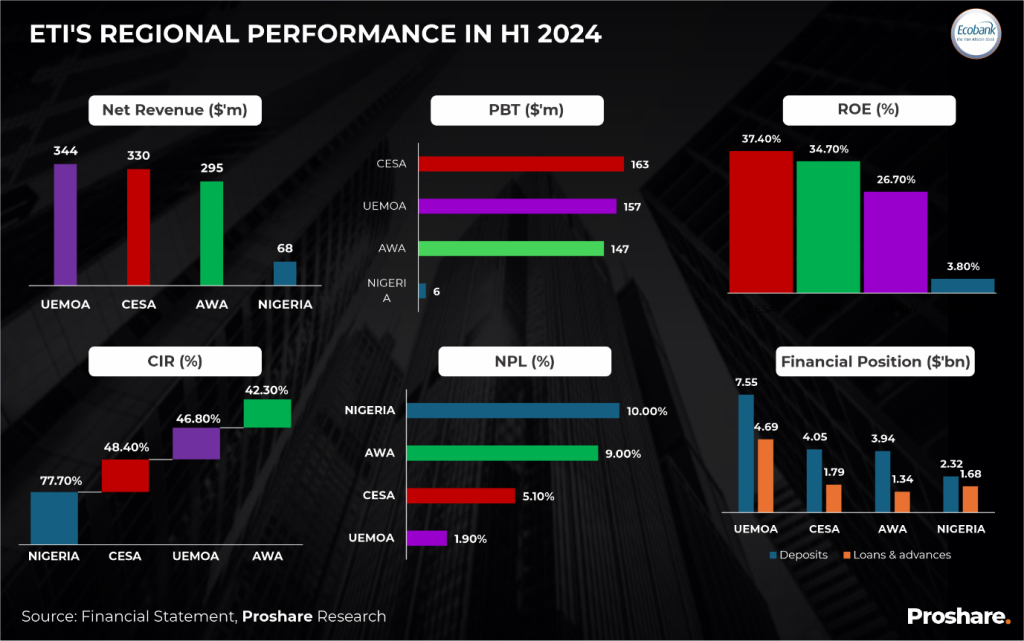
Key Highlights H1 2024
- ETI gross earnings rose by +179.26% from N667.68bn in H1 2023 to N1864.27bn in H1 2024 by fell by -0.43% in dollar term to $1362.30mn in H1 2024
- The group’s operating expenses rose by +165.00% to N728.73bn in H1 2024 from N274.88bn in H1 2023 due to inflationary pressure.
- Profit before tax increased by +195.06% to N443.51bn and profit after tax rose by +195.59% to N311.02bn in H1 2024.
- Total assets increased by +88.79% to N38.60trn in H1 2024 from N20.45trn in H1 2023, driven by significant growth in loans and advances, investment securities, and cash with the CBN.
- Loans and advances to customers rose by +92.78% to N17.95trn in H1 2024 from N9.31trn in H1 2023.
- The group’s customer deposits rose by +92.10% to N28.26trn in H1 2024 from N14.71trn in H1 2023.
- Earnings per share increased to N8.78k in H1 2024 from N3.19k in H1 2023, but in dollar terms, EPS fell slightly to US$0.64 in H1 2024 from US$0.65 in H1 2023.
- Retained earnings increased by +94.27% to N1.02trn in H1 2024, fuelling +68.43% in shareholder’s equity to N2.25trn in H1 2024.
Key Highlight Q2 2024
- Net interest income rose by +160.00% to N375.11bn in Q2 2024 but declined by -5.00% in US dollars to US$268.46mn in Q2 2024 from US$281.35mn in Q2 2023.
- The Group’s non-interest income rose by +182% from N113.36bn in Q2 2023 to N319.59bn in Q2 2024. It rose +4.00% in dollar term to US$229.57mn in Q2 2024.
- Operating income rose by +170% to N695.70bn in Q2 2024 from N257.73bn in Q2 2023 while operating expenses rose +152.00% to N370.76bn in Q2 2024.
- The group’s profit before and after tax rose +162.00% and +163.00% tN241.95bn and N170.03bn in Q2 2024, respectively.
- Impairment charge rose +357.00% to N81.99bn in Q2 2024 from N17.93bn in Q2 2023.
Gross Earnings
The passthrough of the rate hike to lending rate across Africa widened ETI’s gross earnings. The top-line earnings grew by +179.26% to N1.86trn in H1 2024 from N667.58bn in H1 2024, leveraging interest and non-interest income. The interest income came from higher loans & advances (+61.40%), Treasury Bills (+147.86%), and Investment Securities (+224.09%). Similarly, foreign exchange gain, net fee, and commission income drove non-interest income growth. The group generated 49% of its net revenue from Corporate & investment banking and 27% and 24% from consumer and commercial banking, respectively.
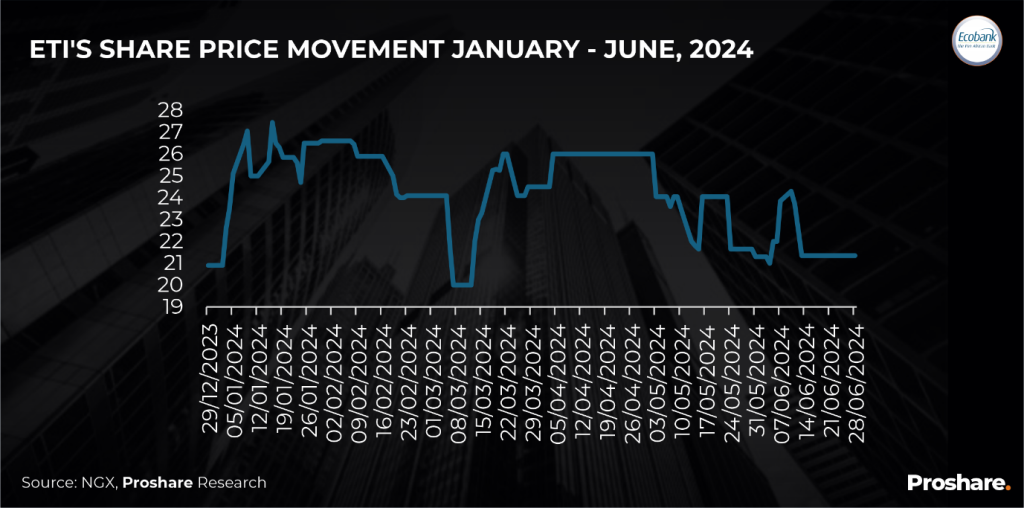
In dollar terms, the gross earnings dipped -0.43% from US$1.37bn in H1 2023 to US$1.36bn in H1 2024 due to the naira depreciation (see chart 1 below).
Chart 1:
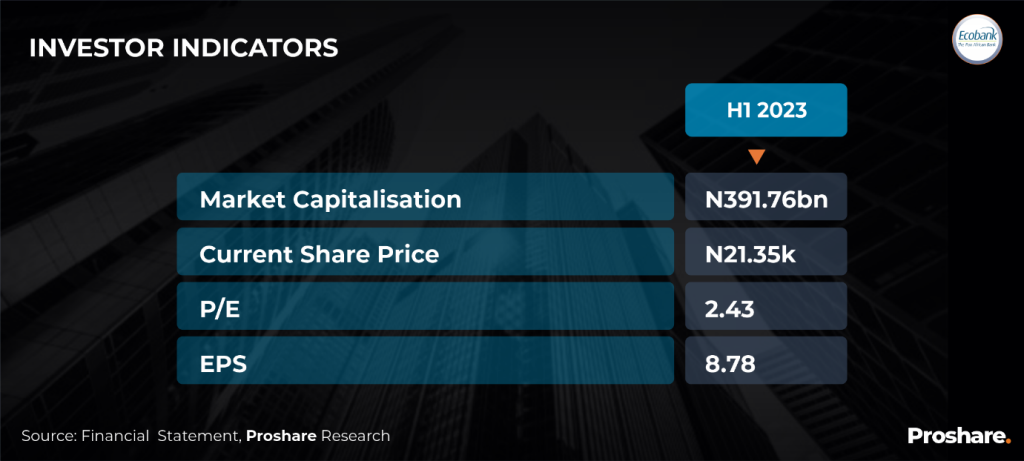
Profitability
The group recorded triple-digit profitability growth, as profit before tax (PBT) and profit after tax (PAT) rose +195.06% and +195.59% to N443.51bn and N311.02bn, respectively, in H1 2024 despite the higher operating expenses. In dollar terms, the group’s PBT and PAT had modest growth of +5.20% and +5.39% to US$324.09mn and US$227.28mn, respectively. Analysts expect the group’s profitability growth to persist in the remaining quarters (see chart 2 below).
Chart 2:
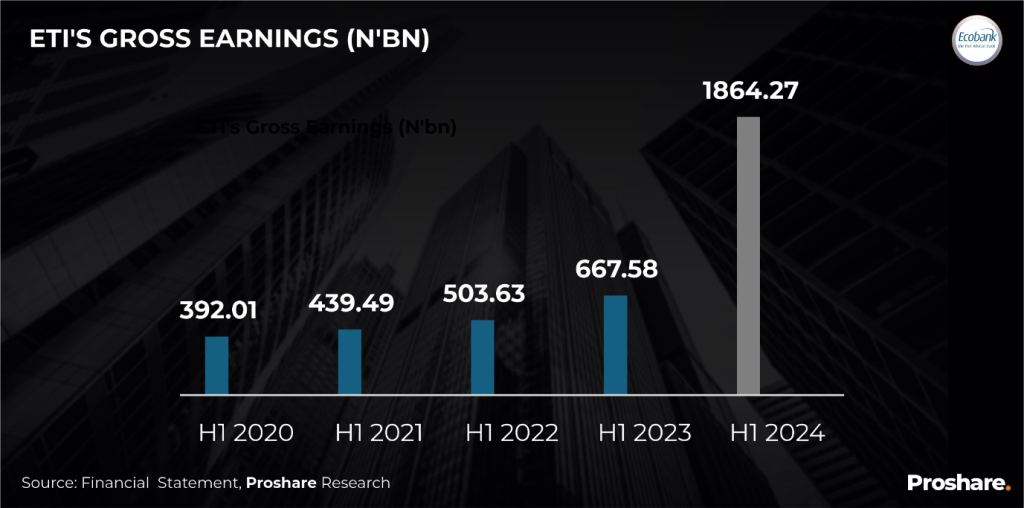
Financial Position
The group’s financial position improved as total assets grew +88.79% to N38.60trn in H1 2024 from N20.45trn in H1 2023. This was driven by a +92.78% increase in loans and advances to N17.95trn and a +84.24% increase in investment securities to N9.45trn in H1 2024. In dollar terms, the total assets dropped from US$27.04bn in H1 2023 to US$25.94bn in H1 2024. The naira devaluation reduced the group’s financial position in dollar terms and would likely persist in subsequent quarters with the non-abating naira depreciation. The increased retained earnings drove the +68.43% rise in shareholders’ equity to N2.25trn in H1 2024 from N1.33trn in H1 2023. The customers’ deposits rose by +92.10% to N28.26trn in H1 2024 from N14.71rn in H1 2023 (see table 2 below).
Table 2:
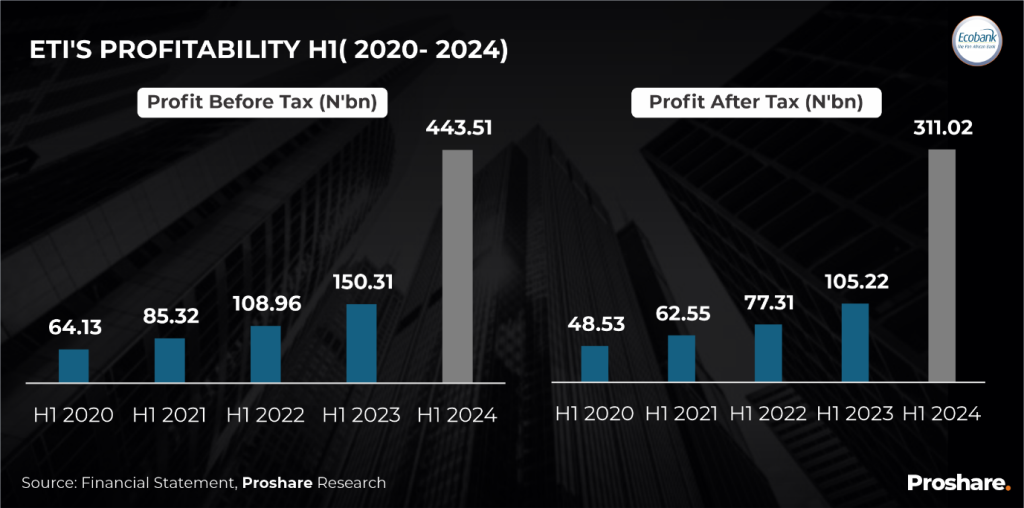
Financial Ratios
The bank’s financial ratios improved in H1 2024 as increased profitability drove the return on asset, return on equity, and net interest margin to 32.90%, 0.81%, and 5.50%, respectively. The slower growth in operational costs relative to revenue dragged the cost to income to 53.60% in H1 2024, showing better cost minimization. The high-risk environment drove the cost of risk to 2.07% in H1 2024 from 0.71% in H1 2023, but the nonperforming loan ratio declined to 3.40% (see table 3 below).
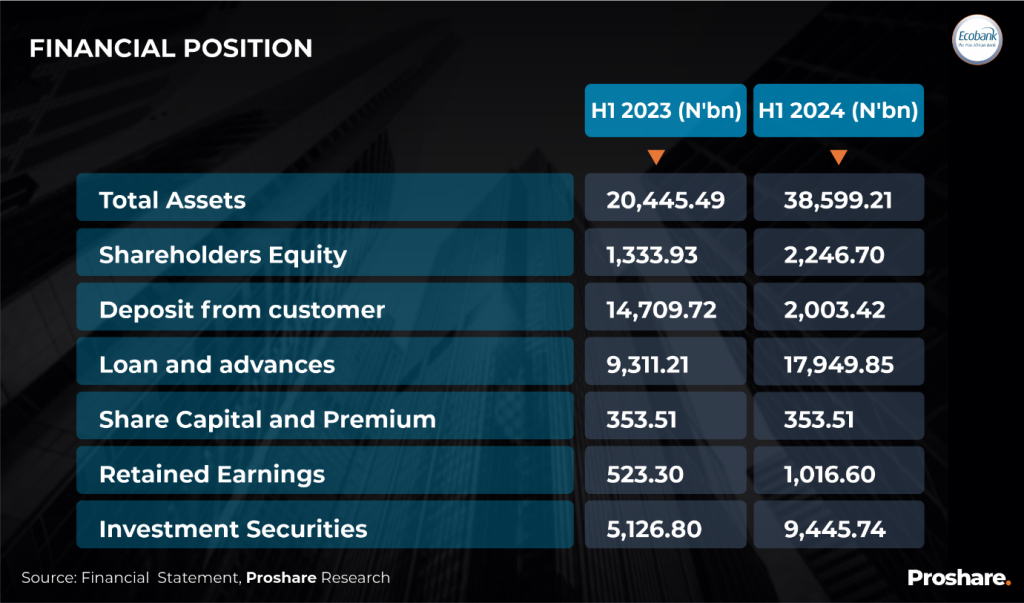
Table 3:
Valuation
A faster increase in earnings per share relative to the share price drove ETI’s Price-to-Earnings lower to 2.43x in H1 2024 from 4.76x in H1 2023. Increased profit for the period drove the rise in the group’s book value, resulting in a decline in the price-to-book value from 0.21x in H1 2023 to 0.17x in H1 2024. The Pan-African bank remained priced below its book value, implying investors possibly discount the risk associated with strong dominance across African countries (see table 4 below).
Table 4:
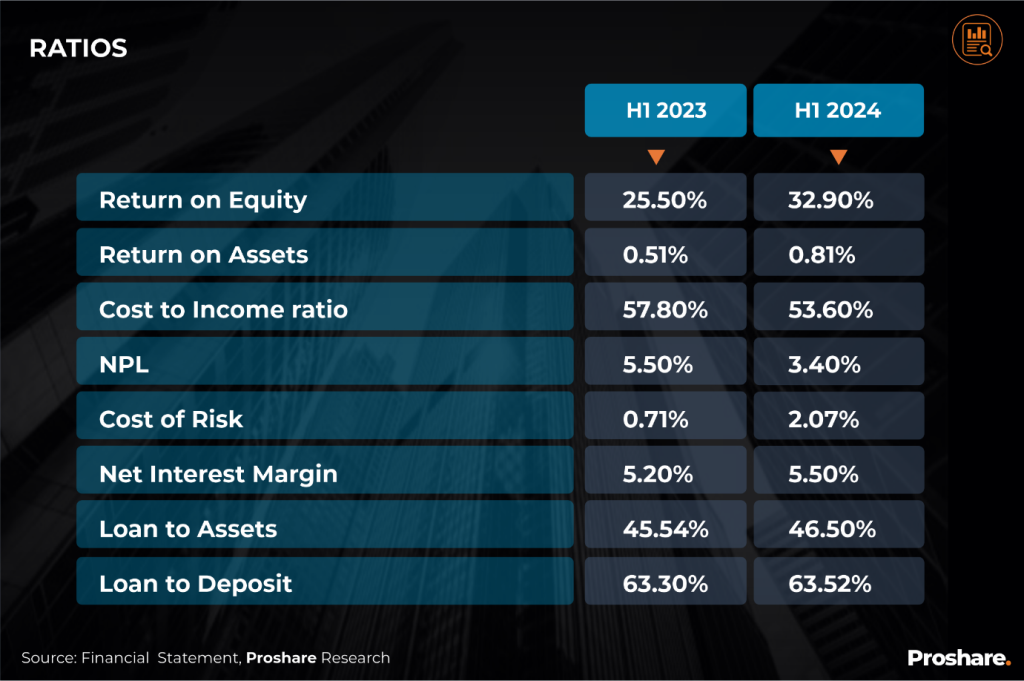
Share Price Movement
In H1 2024, ETI’s share price became more volatile with less flatline. The share price rose consistently from N20.90k on January 02, 2024, peaking at N27.05k on January 09, 2024, then dropped thereafter, stabilising between N22.00k and N25.00k. By the end of June, the share price settled at N21.35k, generating a year-to-date return of +2.15%, higher than the NGX banking index return of -7.47% (see chart 3).
Chart 3:

ETI’s Regional Performance in H1 2024: Positive
ETI’s dominance in African countries increased its exposure to exchange rate risk, inflation pressure, debt sustainability risk, and geopolitical shocks. These risks pull back the performance of some regions, but other areas could bypass the tight macroeconomic environment to attain strong performance. Nigeria’s rising inflation, naira devaluation, and regulatory changes pulled the Nigerian subsidiary off the recovery wheel attained in 2023. The Nigerian subsidiary saw net revenue, profitability, and net interest margin decline while the NPL ratio rose to double digits. Anglophone West Africa (AWA), Francophone West Africa (UEMOA), and Central, Eastern and Southern Africa (CESA) regions had smaller negative impacts and generated robust revenue, profit, and positive financial ratios. Analysts believe the Nigerian business segment might remain a pain point for the group for the remaining quarters of 2024. Still, the positive performances from other regions should cushion the Nigerian exposure (see illustration 1).
Illustration 1:
Closing Thoughts
The IMF’s expectation of a 3.8% average GDP growth rate and a halving of inflation rate in Sub-Saharan Africa suggests a slight easing in the business environment, which could be helpful to the Ecobank Group. The Holdco saw a significant improvement in most operating subsidiaries in H1 2024. Analysts expect the sustained continental monetary tightening and currency volatility to assure positive performance in H2 2024. Also, the Nigerian 70% windfall tax on FX gains should have little effect on the group’s profitability, given that the Nigerian subsidiary accounts for only 2% of the total group profit before tax.
Uncertainty surrounds the recapitalisation of Ecobank Nigeria, ETI’s local Nigerian subsidiary. The Nigerian subsidiary holds a national license and is expected to have a tier 1 capital base of N200bn by 2026, which, at first glance, appears to be a low hurdle for the group. The group’s total share capital and premium as of H1 2024 was N353.51bn. However, a share capital and premium of N200bn for the Nigerian subsidiary would equal 56.58% of the group’s tier 1 capital less retained earnings. Pulling up the group’s Nigerian share capital over the next two years could dilute earnings per share and drown shareholders’ dividends if not supported by a scrip (or bonus) issue.
With the Nigerian subsidiary lagging behind others in continental performance, raising capital to fund this segment of the group’s operation would require careful capital allocation consideration. Questions that may need answers would include, among others:
- Should existing shareholders raise funds to strengthen the capitalisation of local Nigerian operations through a rights offer?
- Should the group initiate a Public Offering (IPO) to raise fresh cash and strengthen the Nigerian operations despite its relatively lower return on equity (ROE)?
- Should ETI sell off its Nigerian subsidiary, while holding a smaller minority stake?
- Could an injection of fresh tier 1 capital into Ecobank Nigeria resurrect its fortunes? Over what timeframe and at what cost?
- Will the recapitalisation of Ecobank Nigeria materially affect the group’s future share price and corporate valuation?
These are interesting times for the ETI group and other African banking institutions as continental monetary and fiscal policy shifts, foreign exchange uncertainties, and global political and economic fragmentation reshape the continental and global business and financial landscape. Late British Prime Minister Baroness Margret Thatcher once observed that ‘Pennies don’t come from heaven. They have to be earned here on earth.’ Shareholders of banks in Nigeria are squaring up to this message.
Adapted fully from the Prosshare



